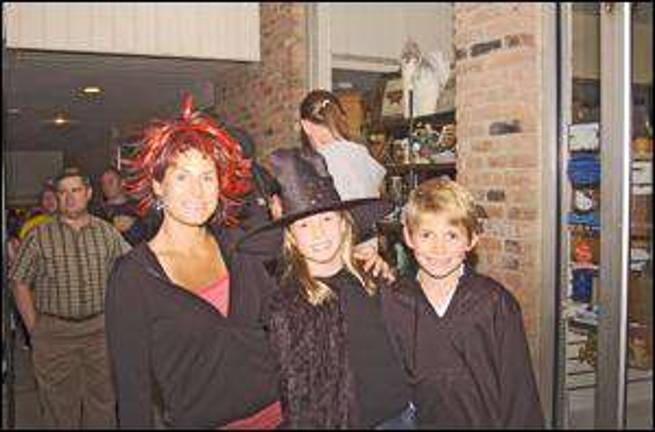Potter madness hits Sparta

Sparta n Midnight nears and a crowd of some 400 gather in front of Sparta Book, waiting for the magic moment, one minute past midnight, when “Harry Potter and the Deathly Hallows” would be theirs. Sleepy-eyed children up way past their bedtimes lean against their parents, while bouncy pre-teens wave magic wands and pretend to cast spells to speed the time along. Eleven-forty fifty fifty-five fifty-nine. A thrill of excitement rustles through the crowd, and the murmur is punctuated with cries of “Is it time yet, Mom?” Then bookstore owner Doug Cernak pulls up to the curb in his small station wagon and starts unloading box after box of the seventh n and last n book in the Harry Potter series. Over 230 customers had paid full price, $34.99, for their books in advance, which left only 20 copies of J.P. Rowling’s bestseller up for grabs. The crowd cheers and surges toward the door. Someone rings a bell. The moment has come. “We got the first book; we got the first book,” exclaims Cara Ross, as she hugs her copy and then waves it on high. “No, we got the first,” shout Justin Wahad and Victoria Tamian. “This book has everything, absolutely everything,” Tamian said, as she clutched Wahad’s arm. “Harry Potter captivates the imagination like no other literary book would,” Wahad says. Both Wahad, a guitarist, and Tamian, an artist, say they care about no other books. Katarina McKeever, 13, of Sparta agrees. “Harry shows a world where there is no religion but love, which makes all things possible,” she said. On Saturday, Will Toner, 18, and his mother, Elizabeth, arise before six a.m. to be among the first to get their copy from a local grocery store chain. The early morning odyssey to get the latest Harry book is a tradition in the Toner family, Will explains. “The Harry Potter stories are magic,” Will says. “They are well-written, and transport you to a place you would love to visit. The stories aren’t just fantasy, though. They keep you real, because they deal with life, death, annoying relatives and the problem of evil.” Nationwide, “Deathly Hallows” sold 8.3 million copies in its first 24 hours on the market n that’s some 50,000 copies a minute, according to figures released by its U.S. publisher, Scholastic Books. By Monday, Amazon was listing the book for a discounted price of $17.99, but first editions were listed at prices that topped $229. As many adults as children are enthusiastic about the Potter books. Writing in the Wall Street Journal just after the publication of “Harry Potter and the Half-Blood Prince,” reviewer Jonathon V. Last praised the book, remarking on the parallels an astute reader can find in its pages to pre-World War II Britain, and suggesting that the book be read as a companion to William Manchester’s biography of Winston Churchill. The series, however, remains controversial. “I do allow my children to read the books,” says Dr. Patricia Ireland, a mother of four. “But I think parents ought to be aware that some of the Potter Web sites contain undesirable links that lead to other sites dealing in the occult.” Ireland suggests that parents review the books carefully before allowing younger children to read them. The assertion is that younger children are likely to have limited moral reasoning abilities, and may need help in separating fact from fiction and understanding the complex ethical and moral issues raised. Pope Benedict XVI also raises cautions. “[T]hese are subtle seductions that are barely noticeable and precisely because of that deeply affect (children) and corrupt the Christian faith in souls even before it [the Faith] could properly grow.” “ Some critics say the books are flawed but essentially harmless fantasy, filling a real need; others decry them as the next stage in the ongoing degeneration of culture. In either case the books invite an appraisal, for they are going to be a major influence in the values and perceptions of the coming generation,” says novelist Michael O’Brien in his essay “Paganization of Children’s Culture” But the Anglican Church has just published a guide for parents and others who want to use Harry Potter to teach young people to think, according to a BBC report, which quotes the Right Rev. John Pritchard, Bishop of Oxford, as saying, “There’s plenty in the Harry Potter books to make young people think about the choices they make in their everyday lives and their place in the world.”